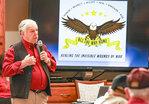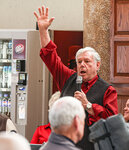Former Marine Corps aviator Dr. David Hammer flew more than 100 combat missions during the Vietnam War but his biggest battle has been fighting the effects of war and helping others deal with their …
This item is available in full to subscribers.
We have recently launched a new and improved website. To continue reading, you will need to either log into your subscriber account, or purchase a new subscription.
If you are a digital subscriber with an active subscription, or you are a print subscriber who had access to our previous website, then you already have an account here. Just reset your password if you have not yet logged in to your account on this new site.
If you are a current print subscriber and did not have a user account on our previous website, you can set up a free website account by clicking here.
Otherwise, click here to view your options for subscribing.
Please log in to continue |


Former Marine Corps aviator Dr. David Hammer flew more than 100 combat missions during the Vietnam War but his biggest battle has been fighting the effects of war and helping others deal with their post-war issues.
Hammer was a special guest at the Missouri Veterans’ Home on Friday, Nov. 10, for a special Veterans Day celebration. Hammer, who is a professor emeritus of civil environmental engineering at the University of Missouri, helped form a not-for-profit with his church pastor called All The Way Home that helps Veterans deal with post-traumatic stress disorder (PTSD) and another condition called moral injury.
Hammer said the Vietnam War was different from previous wars fought by the U.S. because of the way it was perceived by the public. Many returning service members were not treated well on top of having brought back issues no one knew how to deal with.
“We were the first ones to go fight and have half or more of the population give us a hard time when we did it and when we came home,” Hammer said. “When we returned home to a population, many of them did not appreciate what we had done and were antagonistic towards us.”
Hammer said the way issues are addressed today is much better than when troops returned home from Vietnam.
“The diagnosis of PTSD and moral injury have occurred because of the way we stepped forward when we came home and asked for better treatment than what others had received,” Hammer said. “We didn’t bring a disability or a disorder. We brought a wound to the soul and spirit.”
Hammer began to experience PTSD about eight years after coming back home. One day he was studying for a test when he got an overwhelming feeling to call his former wingman in Vietnam. It took him about 90 minutes to find his phone number. When he called he was about 10 minutes too late. His wingman had taken his own life like many Veterans who experienced PTSD have done.
Hammer said when he talked to other Veterans he would often hear the same things.
“I had heard about so many civilians saying ‘Well you’re home now,’ and I’ve heard so many Veterans say, ‘Well it doesn’t feel like home. I don’t fit. I don’t belong,’” Hammer said. “People don’t understand what they did and when they try to talk about it they usually pissed them off. I’m sure all of you have been there to a certain extent.”
All The Way Home is a program that raises awareness of combat-induced PTSD and moral injury. It creates a “circle of trust” and renewal in Veterans to where they can share their stories without being judged, criticized, or having to listen to unsolicited advice.
Hammer also encourages Veterans to participate in a program that records Veterans’ stories so that future generations can learn.
“I think storytelling is the best thing we can do no matter how old we are to deal with what we discover and have to bring home with us when we come,” Hammer said. “It’s also the best way to educate those who are coming behind us, many of whom are clueless and aren’t willing to learn. Someday they will and it’s really important we get our stories on record.”
Hammer said today’s warriors are coming home to a much more understanding population but some of the baggage they’re bringing back is just as bad if not worse than past wars.
“It’s time for us as a country to recognize all the costs of war at home and abroad,” Hammer said.